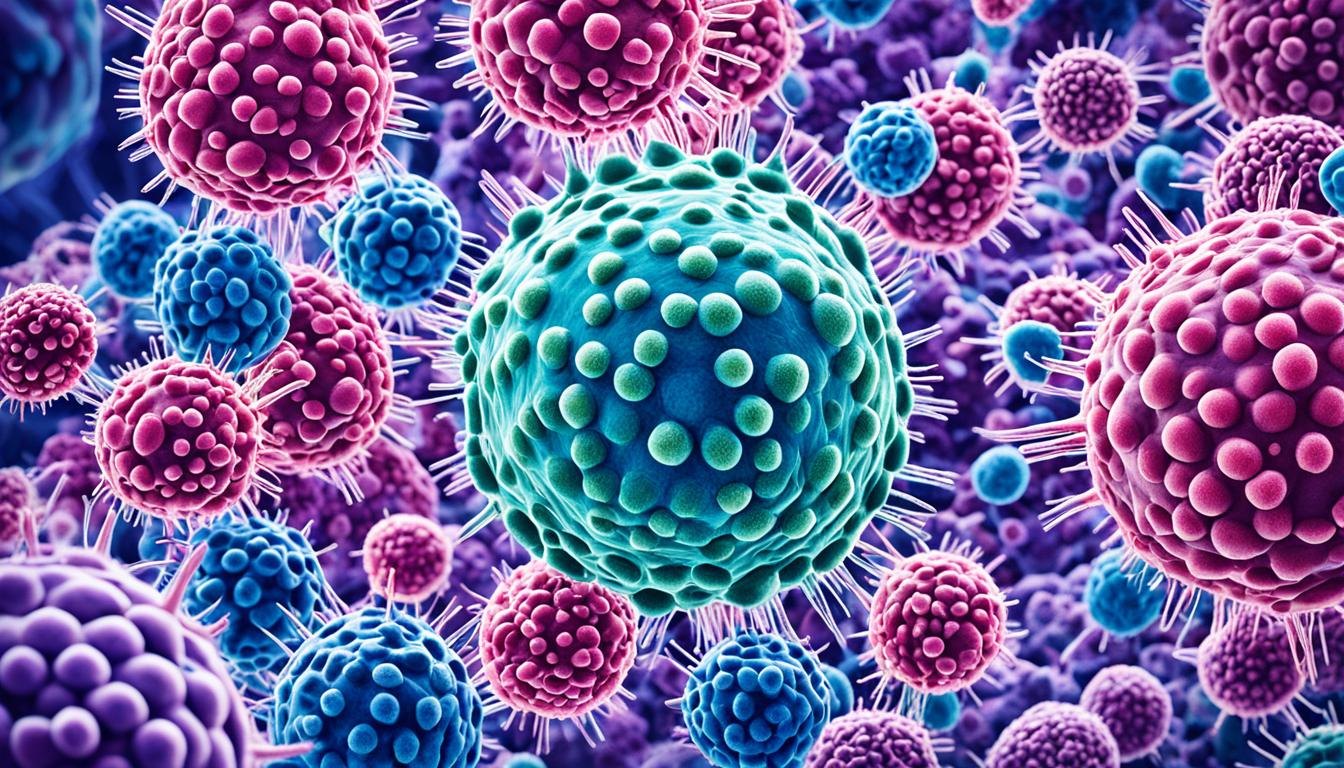Merkel cell carcinoma is a rare but strong kind of skin cancer. It often starts on the face, head, or neck. You might see it as a nodule that doesn’t hurt. It is also called neuroendocrine carcinoma of the skin. We’re not sure about the exact cause, but we do know that too much sun and weak immune systems might make it more likely.
This cancer can grow quickly. You might see a nodule that is either flesh-colored or bluish-red. Any changes in how it looks or feels are a sign to see a doctor. A skin biopsy, done by a dermatologist, can tell if it is Merkel cell carcinoma.
Doctors need to know how far the cancer has spread for the right treatment. Sometimes, they use advanced methods like stem cell therapy and immunotherapy. These kinds of treatment fight cancer in a specific way, trying not to harm healthy cells.
The sooner Merkel cell carcinoma is found and treated, the better the chances for a full recovery. Talking to a healthcare professional is the first step. They can make a plan just for you, helping you get the right treatment.
Key Takeaways:
- Merkel cell carcinoma is a rare and aggressive form of skin cancer.
- It commonly appears as a painless nodule on the skin, usually on the face, head, or neck.
- Long-term sun exposure and a weakened immune system may increase the risk of Merkel cell carcinoma.
- Seek medical evaluation for any changes in size, shape, or color of skin nodules.
- Treatment options depend on the stage and spread of the cancer, with advanced therapies like stem cell therapy and immunotherapy available in certain cases.
Causes and Risk Factors
Merkel cell carcinoma is a rare but fast-growing skin cancer. It has several causes and risk factors. A virus called Merkel cell polyomavirus (MCPyV) is key in many cases. This virus normally lives on the skin without causing problems. But sometimes, it can trigger Merkel cell carcinoma.
Too much sun can also up your risk of getting this cancer. Being in the sun a lot, either naturally or with tanning beds, can be harmful. Skin cancer risk increases on areas the sun touches. To avoid this, always use sunscreen, wear protective clothes, and stay in the shade during sunny hours.
If your immune system is weak, you might be at risk too. Illnesses like HIV or certain leukemias can lower the body’s cancer-fighting abilities. This allows cancer cells to grow and spread more easily.
History with skin cancer? Your risk goes up. If you’ve had basal cell or squamous cell carcinoma, for example, watch out. Stay alert with regular skin checks to catch any problems early.
Older people and those with light skin face more risk. But Merkel cell carcinoma isn’t limited to them. Younger or darker-skinned individuals can also get it. Yet, knowing the risk factors can help everyone stay vigilant.
Who is at Risk?
In summary, too much sun, a weakened immune system, and a skin cancer past increase your risk. So do being older and having a lighter skin tone. But remember, Merkel cell carcinoma can affect anyone. Early diagnosis and the right care make a big difference.
Diagnosis and Treatment
The first sign of Merkel cell carcinoma is often a fast-growing bump on the skin, without pain. If it changes in size, shape, or color, it’s crucial to see a doctor.
Doctors typically diagnose this cancer with a skin biopsy, taking a tiny sample to check under a microscope. A dermatopathologist will then examine this sample. They look for cancer cells to confirm the diagnosis.
Treatment Options
The treatment for Merkel cell carcinoma varies by how much the cancer has spread. In early stages, it often includes surgery to remove the tumor and some healthy tissue around it.
There might also be radiation therapy. This treatment zaps the cancer with high-energy rays. It can be done from the outside or by placing materials that emit radiation inside the body. This helps kill off any lingering cancer cells.
If the cancer has advanced, immunotherapy could become an option. This uses special drugs to boost the body’s immune system. The immune system then fights the cancer more effectively.
It’s key to work closely with a doctor to pick the best treatment plan for you. The aim is to get rid of the cancer completely and stop it from coming back.
Conclusion
Merkel cell carcinoma is a rare and severe skin cancer. Quick diagnosis and treatment are key. The outcome can be better when caught early and treated.
New therapies like immunotherapy are changing the game. They boost the body’s own defenses to fight cancer. With progress in medical research, there’s hope for those with Merkel cell carcinoma.
If someone you know is dealing with this cancer, getting expert help is critical. Healthcare professionals can tailor a treatment plan to the person’s needs. It’s a tough fight, but with good medical support, beating this cancer is possible.

